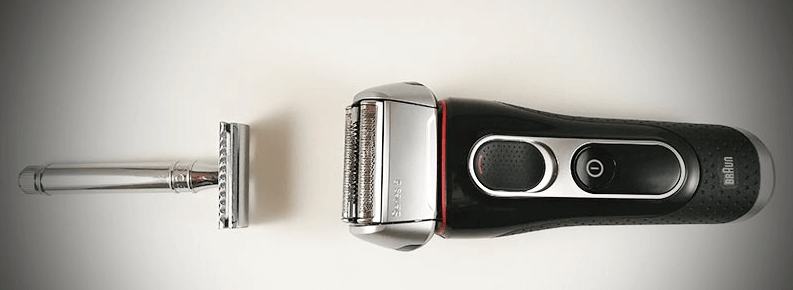
For centuries, men have been grooming their beards to achieve a more youthful appearance, maintain a polished look, or adhere to the grooming standards set by their peers. In their daily shaving routines, razors and electric trimmers are the tools of choice. Similarly, women have embraced shaving not only for their bodies but also for their faces, aiming for cleaner skin and a smoother texture.
In the early days, the manual razor was the sole option available for shaving. However, over the past few years, electric shavers have surged in popularity, leaving many consumers uncertain about which option to select. If you’ve had the experience of using both types of shavers, you may have picked up on some subtle differences. For those who are new to shaving and are seeking an optimal experience, this article will outline the features, advantages, and disadvantages of each method.
4D Shaver vs. Blade
Key Differences Between 4D Shavers and Manual Blades
Below are some key characteristics that differentiate hair removal tools like blades and 4D shavers from other hair removal methods.
Both 4D shavers and manual blades operate by cutting hair at the skin's surface, but their mechanisms for doing so differ significantly. Electric shavers typically feature dual blades or a combination of a blade and a foil that capture and cut hair from both sides, whereas a single blade manual razor typically trims hair in a single motion.
Some common types of manual razors include cartridge razors, disposable razors, safety razors, and straight razors, while basic types of 4D shavers consist of foil shavers and rotary shavers.
Manual blades provide the closest shave, leaving the skin feeling exceptionally clean, while electric shavers offer convenience but do not achieve quite the same closeness. The versatility of 4D shavers is enhanced by multiple attachments, making them user-friendly and adaptable for various grooming tasks.
It is important to note that blades must be used on wet skin, often requiring the application of shaving creams or gels, whereas 4D shavers can be used on both dry and wet skin, lending themselves to on-the-go grooming.

Side-by-Side Comparison
Below is a comparative table that outlines the differences between 4D shavers and manual blades:
Parameter
4D Shavers
Blades
Power Source
Electricity or batteries
None
Speed
Faster
Slower
Cost
$50-200 per set
$10-50 per set
Closeness of Shave
Less close
Closer
Neatness of Skin
Less smooth
More smooth
Hair Regrowth
1-3 days
3-6 days
Travel-Friendly
Yes
Yes
Compatible with Dry/Wet Shaving
Yes
No
Shaving on the Go
Yes
No
Safer for Skin
More
Less
Side Effects
Occasional ingrown hairs and bumps
Cuts, nicks, and ingrown hairs
Understanding the 4D Shaver
A 4D shaver is an electric grooming tool powered by either mains electricity or batteries, allowing for both corded and cordless operation. Some 4D shavers are designed exclusively for dry shaving, while others can be used for both dry and wet applications.
These electric devices utilize rotary blades or foils that mimic the action of scissors to effectively cut hair.
Benefits
Here are several advantages that position electric shavers ahead of manual blades:
- 4D shavers can be utilized for various grooming tasks, including beard trimming, facial hair removal, and body hair grooming.
- They offer a safe and user-friendly experience, significantly reducing the risk of cuts and nicks.
- Electric shavers facilitate a quick grooming routine, allowing you to finish shaving in just a few minutes.
- These devices are easy to clean and eliminate the need for shaving foams, gels, or creams, enabling grooming anytime and anywhere.
- Many electric shavers come with a warranty and can last for several years if properly maintained.
- They are particularly beneficial for those with sensitive skin or conditions such as shaky hands.
Drawbacks
Despite their advantages, there are some drawbacks to consider that might make you rethink using a 4D shaver:
- The closeness of the shave is not as close as that achieved with manual blades, leading to noticeable hair regrowth within a day or two, often with blunt ends.
- 4D shavers tend to be more expensive, with prices ranging from a few hundred dollars.
- There’s a risk of losing or damaging attachments, which can hinder usability.
- Improper usage of electric shavers can lead to an uncomfortable experience.
- Some models are only compatible with dry shaving, eliminating the option for wet shaving.
- Battery failure or lack of electrical power can make it impossible to shave when away from home.
- Electric shavers may feel heavier and more cumbersome compared to their manual counterparts.
- It might take some time to acclimate to using an electric shaver.
Exploring Manual Blades
A blade refers to a manual razor that employs single or dual edges to remove unwanted hair from the face and body. There are specialized razors with horizontal heads for body hair and those with angled heads tailored for facial hair in women.
Manual razors are categorized into disposable and refillable types, with disposable razors intended for short-term use, while refillable ones feature replaceable blades and sturdy constructions.
Pros
Manual bladesseveral reasons
- They provide




































